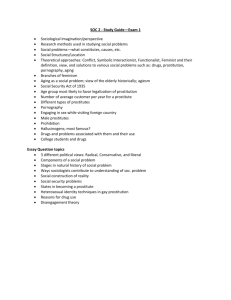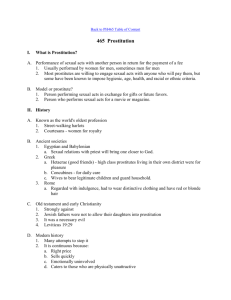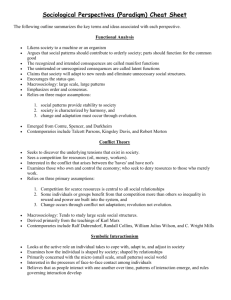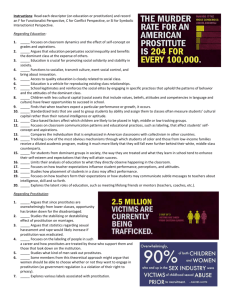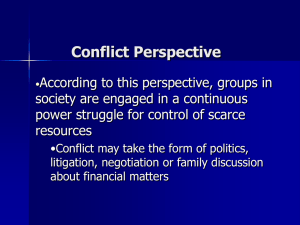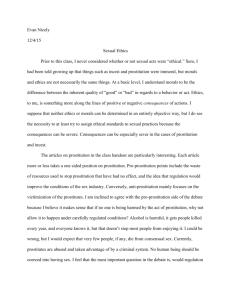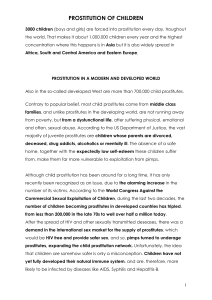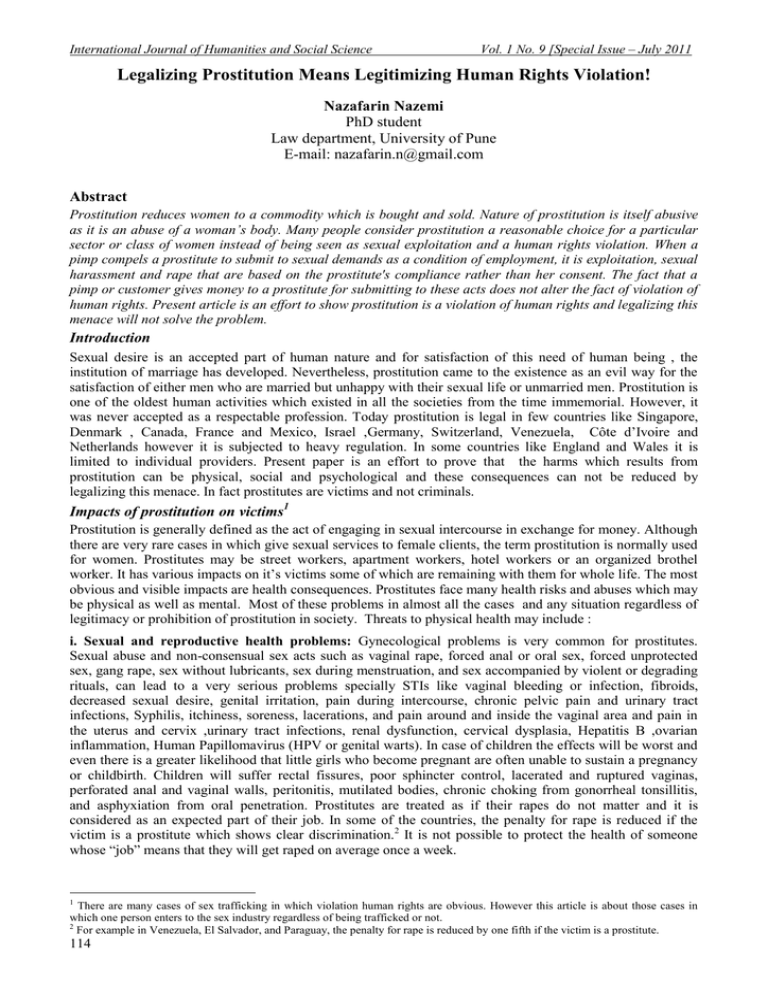
International Journal of Humanities and Social Science
Vol. 1 No. 9 [Special Issue – July 2011
Legalizing Prostitution Means Legitimizing Human Rights Violation!
Nazafarin Nazemi
PhD student
Law department, University of Pune
E-mail: nazafarin.n@gmail.com
Abstract
Prostitution reduces women to a commodity which is bought and sold. Nature of prostitution is itself abusive
as it is an abuse of a woman’s body. Many people consider prostitution a reasonable choice for a particular
sector or class of women instead of being seen as sexual exploitation and a human rights violation. When a
pimp compels a prostitute to submit to sexual demands as a condition of employment, it is exploitation, sexual
harassment and rape that are based on the prostitute's compliance rather than her consent. The fact that a
pimp or customer gives money to a prostitute for submitting to these acts does not alter the fact of violation of
human rights. Present article is an effort to show prostitution is a violation of human rights and legalizing this
menace will not solve the problem.
Introduction
Sexual desire is an accepted part of human nature and for satisfaction of this need of human being , the
institution of marriage has developed. Nevertheless, prostitution came to the existence as an evil way for the
satisfaction of either men who are married but unhappy with their sexual life or unmarried men. Prostitution is
one of the oldest human activities which existed in all the societies from the time immemorial. However, it
was never accepted as a respectable profession. Today prostitution is legal in few countries like Singapore,
Denmark , Canada, France and Mexico, Israel ,Germany, Switzerland, Venezuela, Côte d‘Ivoire and
Netherlands however it is subjected to heavy regulation. In some countries like England and Wales it is
limited to individual providers. Present paper is an effort to prove that the harms which results from
prostitution can be physical, social and psychological and these consequences can not be reduced by
legalizing this menace. In fact prostitutes are victims and not criminals.
Impacts of prostitution on victims1
Prostitution is generally defined as the act of engaging in sexual intercourse in exchange for money. Although
there are very rare cases in which give sexual services to female clients, the term prostitution is normally used
for women. Prostitutes may be street workers, apartment workers, hotel workers or an organized brothel
worker. It has various impacts on it‘s victims some of which are remaining with them for whole life. The most
obvious and visible impacts are health consequences. Prostitutes face many health risks and abuses which may
be physical as well as mental. Most of these problems in almost all the cases and any situation regardless of
legitimacy or prohibition of prostitution in society. Threats to physical health may include :
i. Sexual and reproductive health problems: Gynecological problems is very common for prostitutes.
Sexual abuse and non-consensual sex acts such as vaginal rape, forced anal or oral sex, forced unprotected
sex, gang rape, sex without lubricants, sex during menstruation, and sex accompanied by violent or degrading
rituals, can lead to a very serious problems specially STIs like vaginal bleeding or infection, fibroids,
decreased sexual desire, genital irritation, pain during intercourse, chronic pelvic pain and urinary tract
infections, Syphilis, itchiness, soreness, lacerations, and pain around and inside the vaginal area and pain in
the uterus and cervix ,urinary tract infections, renal dysfunction, cervical dysplasia, Hepatitis B ,ovarian
inflammation, Human Papillomavirus (HPV or genital warts). In case of children the effects will be worst and
even there is a greater likelihood that little girls who become pregnant are often unable to sustain a pregnancy
or childbirth. Children will suffer rectal fissures, poor sphincter control, lacerated and ruptured vaginas,
perforated anal and vaginal walls, peritonitis, mutilated bodies, chronic choking from gonorrheal tonsillitis,
and asphyxiation from oral penetration. Prostitutes are treated as if their rapes do not matter and it is
considered as an expected part of their job. In some of the countries, the penalty for rape is reduced if the
victim is a prostitute which shows clear discrimination.2 It is not possible to protect the health of someone
whose ―job‖ means that they will get raped on average once a week.
1
There are many cases of sex trafficking in which violation human rights are obvious. However this article is about those cases in
which one person enters to the sex industry regardless of being trafficked or not.
2
For example in Venezuela, El Salvador, and Paraguay, the penalty for rape is reduced by one fifth if the victim is a prostitute.
114
The Special Issue on Contemporary Issues in Social Science
© Centre for Promoting Ideas, USA
www.ijhssnet.com
ii. HIV/AIDS: Victims have a significant chance of contracting HIV/AIDS, because in many of the cases,
specially when the prostitutes are trafficked victims, they have no control over their body or their life and
cannot protect themselves by insisting on condom use. The risk is further increased by cuts and tears in
vaginal and anal tissue due to rough sex and STI-related ulcers. Prostitutes have sex with both paying
customers and individuals who do not pay. Later group are generally people with whom sex workers interact
on a regular basis which may be boyfriends, husbands, casual friends or relatives. Sex workers mainly do not
use condoms with nonpaying customers for psychological, emotional, and physical reasons such as trust or a
desire to have a child. In this situation the risk of HIV and STD infection is increased.
iii. Lack of access to health care and vulnerability to disease and illness: Inability to access health services
not only deprive them of care, but also deny them a meaningful source of information which can prevent
further problems. Lack of immediate access to health care in case of girls and women can have a broader
impact on society and communities through chronic infectiousness for male partners and their wives.
iv. Drug and alcohol addiction: Many of prostitutes are deliberately introduced to drugs and alcohol by
pimps, boyfriends and husbands as a means of coping with their desires and to perform acts they might
otherwise find objectionable or too risky. Some of them are forced to drink alcohol or use drug with the
clients. Prostitutes who are addicted to drugs are at a greater risk of negative health which include overdose,
increased chance of contracting HIV and other blood-borne diseases through needle/syringe sharing and
multiple vulnerabilities associated with police harassment and violence from clients.
v. Physical injuries due to violence: Sexual assault3 is also a common practice specially in trafficking in
women and children for the prostitution it can happens in all the phases of trafficking. After experiencing
sexual assault, victims may experience a range of physical consequences and emotional reactions, including
severe stress and depression. Violent acts may include forced vaginal, oral or anal sex; gang rape; degrading
sexual acts, forced prostitution, inability to control number or acceptance of clients, forced unprotected sex
and sex without lubricants, sexual humiliation, forced nakedness, coerced misuse of oral contraceptives or
other contraceptive methods.Ill treatment in police custody also can be one of the sources of injuries In fact
physical violence is the norm for women in all types of prostitution. In piratical societies, women are
subordinate to men, which hinders them in complaining about violence.
vi. Poor nutrition, sleep and poor living conditions: prostitutes in some cases specially when they are
trafficked and undocumented, are depriving from basic elements of survival, such as food and proper rest.
vii. Pregnancy and abortion: Prostitutes in highly organized commercial settings are typically provided with
a contraceptive pill. If they become pregnant, usually force them to abort which some times is done by other
prostitutes and in a very unsanitary situation which some times results in their death or negative outcomes of
unsafe abortion.
viii. Police harassment: Violence in arrests, sweeping of streets, ticketing, bribes and harassment are
common practices by police. Asking for sexual services for not making an arrest in another issue. There are
numerous factors which increase prostitute‘s vulnerability to violence and police harassment, including the
absence of official residency documents, high levels of migration for working in sex industry, stigmatization
and discrimination, language barriers, a lack of access to legal aid, lack of access to quality health and social
services and high rates of substance use
In addition to these, there are some mental traumas which are some times even worse than physical violence.
Verbal abuse is a pattern of behavior that can seriously interfere with one's positive emotional development
and, over time, can lead to significant detriment to one's self-esteem, emotional well-being, and physical state.
It has been further described as an ongoing emotional environment organized by the abuser for the purposes of
control.4 Verbal or psychological abuse designed to intimidate, degrade and frighten the individual.
prostitute‘s identity is reduced to induce a depersonalization process supported by the exploiter in order to
shape or make a kind of robot for prostitution. In addition, prostitutes may suffer from disassociation. It is
a mental process that severs a connection to a person's thoughts, memories, feelings, actions, or sense of
identity.5 They don‘t want to live with the reality. This is recognized as a severe impact of sexual abuse which
is in fact the strategy that they chose to be able to survive and in order to be prepared for upcoming threats. In
addition, in most of the cases prostitutes experience social exclusion and social breakdown.
3
. That is any sexual activity between two or more people in which one person is involved against his or her will. Herein victims can
be the expose of unwanted touching, grabbing, oral sex, anal sex, sexual penetration with an object, and sexual intercourse. Trafficking
victims are often made to participate in sexual activities through pressure.
4
.This definition is given by http://en.wikipedia.org ( last visited on 6 April 2011)
5
.This definition is given bye http://en.wikipedia.org ( Last visited on 12 March 2009)
115
International Journal of Humanities and Social Science
Vol. 1 No. 9 [Special Issue – July 2011
Family and community may not accept the victim as their member anymore this stigmatization and they face
rejection by their own family and community.
Prostitution and human rights violation
Looking at all above mentioned impacts of prostitution, there is a necessity to compare them with
internationally accepted human rights to find out how human rights of prostitutes are violated. It is worth to
note that one should not confuse prostitution with sexual liberation. Where sexual liberation may be
considered as a right, prostitution is a violation of human rights. But what are the rights which are violated in
prostitution ? The most important ones are:
Right to life and personal liberty6 and Right to live with dignity7
The right to life is the supreme right, and is basic to all human rights. This is the most obvious right which is
accepted by each and every nation. The right to life does not mean a mere physical existence or the right to
live a lifeless life. The right to life includes the right to live with human dignity and all that goes along with it.
In case of prostitution, victims are deprived from a normal life with dignity. The 1949 United Nations
Convention, entitled ―The Suppression of the Trafficking in Persons and of the Exploitation of the Prostitution
of Others‖ states in its preamble that: ‘prostitution and the evils which accompany it, i.e. the trade in human
beings, are incompatible with human dignity and worth‘.8 This instrument recognizes that a woman‘s rights
are violated whether or not there is consent. According to this document Member States agreed to anyone
who:
• procures, entices or leads away, for purposes of prostitution, another person, even with
the consent of that person;
• exploits the prostitution of another person, even with the consent of that person;
• keeps or manages, or knowingly finances or takes part in the financing of a brothel; and
• knowingly lets or rents a building . . . for the purposes of prostitution.
Prostitution is harmful and abusive and violates the human dignity and integrity .The right to dignity which is
basic premise of international human rights nowadays accepted as the highest human right. The right to
dignity has been usually explained through its understood origin: it has been claimed that this right has neither
been granted by the state nor created by the person himself or herself but exists irrespectively of sex, race and
nationality, as well as from life style. Every human being has been provided with and no one can take this
right to dignity away.
Right not to be tortured or submitted to cruel and/or degrading treatment9 and Right to be
free from physical violence10
In prostitution, women are tortured through repeated rape and wild and vocative treatment either by clients or
the exploiters and subjected to cruel and brutal treatment and verbal abuse without human limits. Exploiters
try to reduce their self confidence through these acts which make it easier to control them.
Right to enjoy psychological, physical and sexual health11, The right to access medical
services12 Right to an adequate standard of living13, Right to the highest attainable standard of health14
Health and human rights have a reciprocal relationship—the right to health can only be achieved when
individuals have the ability to obtain consistent and equitable access to health care and as well as to seek
redress for human rights violations. Article 12 of the International Covenant on economic, social, cultural and
political rights recognizes the right of everyone to the enjoyment of the highest attainable standard of physical
and mental health and provides for the steps which has to be taken member states to achieve the full
realization of this right, including the implementation of measures designed to prevent the spread of disease
and the elimination of discrimination in access to health care and treatment for all. This international
instrument includes sexual and reproductive health in this right and also encourages gender equity. Eenthough
HIV/AIDS and many other diseases are not mentioned, nevertheless many analysts believe that that this
provision should be interpreted to include prevention, treatment, and care services for HIV/AIDS as a health
right.
6
Article 3 of UDHR and ICCPR Articles 6 and 4.
.Art 1 UDHR
8
www.ohchr.org/english/law/traffic/persons.htm
9
.Protected by Art 5 UDHR , Art 7 ICCPR, Art 37 CRC, Convention Against Turture( CAT)entire convention.
10
.Art 3 UDHR ,Art 6 ICCPR ,CEDAW entire convention especially Art 2,5,15 & 16.
11
.Art 25 UDHR , Art 12 CESCR, Art 12 ICESCR
12
.Art25.1 UDHR, 12 CIDAW
13
.Art 25 UDHR and Article 11 ICESCR,
14
Article 12 of ICESCR
7
116
The Special Issue on Contemporary Issues in Social Science
© Centre for Promoting Ideas, USA
www.ijhssnet.com
According to Platform of Action adopted at the UN‘s Fourth World Conference on Women, held in Beijing,
China, in 1995, ―The human rights of women include their right to have control over and decide freely and
responsibly on matters related to their sexuality, including sexual and reproductive health, free of coercion,
discrimination and violence.‖15 Reproductive and sexual rights are essential for enjoyment of right to health.
More over each and every human being should have a freedom to decide about number of his/her children and
the forms of contraception; consistent and unimpeded access to information about reproductive services; the
right to be protected from sexual harassment and abuse; the right to have a satisfying sexual life; and the right
to be protected from sexual violence.
The failure to meet these rights in turn restricts the attainment of ―the right of everyone to the enjoyment of
the highest attainable standard of physical and mental health‖.16Forced drug or substance abuse, deprivation of
food, malnourishment, coerced to have sex with numbers of clients every day, lack of access to medical and
health services are instances of violation of these rights. The commitment to the highest attainable standard of
physical and mental health in the ICESCR provides a substantial support to the right to safety which is not
there in cases of trafficking. In addition Human rights agreements identify several components of this,
including adequate food, clothing, housing, medical care, social services, and social security out of which
almost none of them are available to victims. There are many reasons which prevents prostitutes to refer
medical establishment which makes the women vulnerable to exploitation and extortion such as illiteracy,
ignorance, unsympathetic, indifferent and often humiliating attitude of Medical and paramedical staff towards
prostitutes, asking irrelevant questions by them or asking for free sex. All of these make prostitutes shy away
from medical treatment.
Right to personal autonomy17
The core idea of personal autonomy is to have personal rule of the self while remaining free from controlling
interference by others. The right of privacy has evolved to protect the freedom of individuals to choose
whether or not to perform certain acts or subject themselves to certain experiences. Victims are not able to
decide about their life style. They are widely subjected to threat of reprisals in different ways including
violence and death of themselves or family members back home and they can not act upon their will.
Women's rights of reproduction and control of her body are denied in cases of sexual exploitation. Working
for not chosen master and job, forced drug or substance abuse, forced abortion are other examples. In most of
the cases, prostitutes do not have a control over the numbers and the character of the clients. There is always a
force behind them which may be by pimps, their boyfriend, husbands and even monetary needs.
Right to not to be discriminated18
When a woman is employed to proved a sexual services to men, she is discriminated on the base of her sex.
Although there are few cases of men who are providing sexual services to women, generally the term ―
prostitutes‖ is used for women This list of violated human rights is not exhaustive and depending on the
circumstances of any case, many more human rights might be infringed such as right to family planning, the
right to privacy, the right to bodily integrity, the right to pursue a satisfying and safe sexual life, right to
freely chosen work, just and favorable conditions of work , fair and non discriminatory wages, safe and
healthy working conditions, social security an right to education, right to equality before the law and equal
protection of law. In addition to breaching an individual‘s human rights, the prostitution is a violation of the
rights and dignity of human beings as a whole. ―When the body and sexual capacity of a person is consumed
and exploited as a commodity, it is not only a social and health issue but also and ethical and human rights
question‖.19
Human rights of the prostitutes are violated by various people including:
Governmental authorities: At the center of these authorities are the police officers who are in charge of
prosecution and arrest of the sex workers . While doing so, physical violences are common . Some times they
ask for sexual services or money in exchange of not making an arrest . As regards documentation-related
issues, police may arrest them for not having proper documents and takes away those documents which
makes them more vulnerable. They may be coerced for sex and displaced .
15
For more information see the UN‘s Fourth World Conference on Women Available at www.
un.org/womenwatch/daw/beijing/index.html. ( last visited at April 28, 2011)
16
.Art 12.1 ICESCR
17
.Protected by Para 97 BPFA (Beijing Platform for Action), Art 12 UDHR
18
.Art Articles 2, 24, 26ICCPR and Art Art 10 ICESCR and Art 2 CRC, Convention on the Elimination of All Forms of Racial
Discrimination, entire convention.
19
Finnish Programme for the Prevention of Prostitution and Violence Against Women 1998-2000
117
International Journal of Humanities and Social Science
Vol. 1 No. 9 [Special Issue – July 2011
They are even subjected to Compulsory HIV/STI testing which is violation of human rights . In addition lack
of proper enforcement of laws related to sex work results in disappointment of the victims from authorities
which prevent them from referring to them even for seeking justice or in cases of which they want to leave
working as a prostitute.
Pimps: In case that a prostitute is working under another person, the only think which pimps are
thinking about is increscent of the profits. They do not care about the health of the sex workers . Prostitutes
can not decide whether, when, how, and where to work . They have to give services to numbers of clients in a
day without proper living conditions
Clients : Clients are some times very harsh to the victims asking for different kind of sexual services,
abusing and even beating the prostitutes.
Media : Right to privacy of the sex workers are mainly violated by median by showing their faces and
publishing their pictures and identities which increase stigmatization of them and prevent their rehabilitation.
The most important and authoritative international treaty specifically addressing women‘s human rights is the
U.N. Convention on the Elimination of All Forms of Discrimination against Women (CEDAW). CEDAW
requires state parties to take all appropriate measures to remove obstacles and to foster the conditions
necessary for women to realize their full potential as the equals of men. In Part I of the text of the convention
Article 6 states that:
‗State parties shall take all appropriate measures including legislation, to suppress all forms of traffic in
women and exploitation of prostitution of women‘. General Recommendation 19 in CEDAW calls upon states
to take measures to combat gender-based violence, which can impair the ability of women to access their
human rights and fundamental freedoms—including the right to life; the right not to be subject to torture or
cruel, inhuman, or degrading treatment or punishment; the right to legal protection; the right to liberty and
security of person; the right to equal protection under the law; and the right to the highest attainable standard
of health. Recommendation 19 recognizes the need for special protection of ―prostitutes‖ because of their
particular vulnerability to violence. General Recommendation 24, emphasizes the importance of states to
closely consider the societal determinants of health, paying particular attention to the health needs and rights
of women belonging to vulnerable and disadvantaged groups, including migrant women and women engaged
in prostitution.
U.N. Declaration on the Elimination of Violence against Women 1993 in Article 2 b targets ‗Physical, sexual
and psychological violence occurring within the general community, including rape, sexual abuse, sexual
harassment and intimidation at work, in educational institutions and elsewhere, trafficking in women and
forced prostitution. The Vienna Declaration and Programme of Action adopted by the world conference
declares that ‗The human rights of women and of the girl-child are an inalienable integral and indivisible part
of universal human rights‘. Article 18 states that ‗Gender-based violence and all forms of sexual harassment
and exploitation, including those resulting from cultural prejudice and international trafficking, are
incompatible with the dignity and worth of the human person, and must be eliminated. This can be achieved
by legal measures and through national action and international cooperation in such fields as economic and
social development, education, safe maternity and health care, and social support.
This Declaration in Article 1 adopts a broad definition of violence against women as ―any act of gender-based
violence that results in, or is likely to result in, physical, sexual or psychological harm or suffering to women,
including threats of such acts, coercion or arbitrary deprivation of liberty, whether occurring in public or in
private life‖.
Since 1991 The European Parliament has passed resolutions opposing prostitution. Recently the
European Parliament resolution on the current situation in combating violence against women and any future
action (2004/2220(INI). In that resolution, among several recommendations to governments on taking
measures to combat gender violence, recommendation 3.(i) urges member governments ‗to combat the idea
that working as a prostitute can be equated with doing a job‘.
Therefore it seems that international community as a whole accepted prostitution can not be accepted as a job
and it is a violation of rights of desperate woman who have no choice but to sell their own body to stay alive.
Whether Prostitutes should be legalized?
There are various reactions to the issue of prostitution in countries around the glob which can be divided as
follows
Prohibition: Some countries which directly prohibit prostitution and considered as a criminal activity.
Punishment may range from fine to long term jail sentences. All activities
relating to prostitution are criminalized including soliciting, procuring, pimping, and brothel keeping
118
The Special Issue on Contemporary Issues in Social Science
© Centre for Promoting Ideas, USA
www.ijhssnet.com
Absence of legal regulation: there are many countries in which the issue of the prostitution is simply
ignored. Legal system of such countries neither prohibits nor allows prostitution.
Abolition: Herein prostitution is viewed as a harmful activity and law aim to eradicate it. Prostitution
is seen as a form of violence against women. Women in prostitution are considered victims and men
who buy sex acts, pimps, brothel keepers and traffickers are criminals.
Allowance and regulation: There are countries in which prostitution of adults is not considered as a
crime and it is permitted, nevertheless, it is regulated by the government and there are some rules that must be
followed by prostitutes and brothel owners. prostitution is legalized as a form of service work (sexual
services). Regulations are set up circumstances prostitution can be engaged in. According to this approach,
prostitutes are sex workers; men are clients; pimps are managers; brothel owners are business people and
traffickers are employment agents who assist sex workers to travel to destination countries. Selling sex is
illegal only if the regulations are violated and state collects tax revenue from the industry and income earners.
Internationally, the legalization of prostitution is increasingly promoted as the solution to the escalation of a
global sex market coupled with the trafficking of human being. But the question is that whether legalization
of prostitution is a solution? In 1999, the International Labor Organization called for the recognition of the
―sex sector‖ as part of the economy. It did say that formal recognition of the sex industry would ensure ―labor
rights and benefits to sex workers,‖ improve ―working conditions,‖ and ―extend the taxation to cover many of
the lucrative activities connected with it.‖ The ILO was acquiescing to economic determinism – if the sex
industry is large and makes a lot of money, then it should be recognized and regulated.
Advocates of legalization of prostitution argue that, if prostitution become a legitimate work, then human
rights of the prostitutes will be protected. They say existence of law makes it easier to protect human rights of
the prostitutes. According to them prostitution is a inevitable reality of every society therefore it is needed to
be protected They believe in numbers of benefits in that for prostitutes, many of which focused on the their
freedom from economic and sexual exploitation. legalisation gives prostitution the same status as any other
occupation and provides prostitutes with access to social security and healthcare, regulating their places and
terms of employment, etc. They will be treated as a worker and utilize their right without any violation. They
also argue other benefits for the society in large such as confinement of prostitution in certain areas and
compulsorily regular test protect prostitutes and society from spread of sexually transmitted diseases (STDs).
Even though all of these can be true to some extent, nevertheless, none of them can change the real abusive
nature of prostitution. In addition, mandatory testing gives false hope to both prostituted women and the
community that their health is protected. Even in existence of regular tests for STDs, " if a prostitute is being
tested every week for HIV, she will test negative for at least the first 4-6 weeks and possibly the first 12 weeks
after being infected.... This means that while the test is becoming positive and the results are becoming
known, that prostitute may expose up to 630 clients to HIV. This is under the best of circumstances with
testing every week and a four-week window period. It also assumes that the prostitute will quit working as
soon as he or she finds out the test is HIV positive, which is highly unlikely. This is not the best approach for
actually reducing harm. Instead, in order to slow the global spread of HIV/AIDS we should focus our efforts
on abolishing prostitution."20
Moreover, legalized system of prostitution often mandates health checks , but only for women and not for
male buyers. Health examinations or tests for women but not men make no public health sense because
monitoring prostituted women does not protect ―them‖ from STDs. Legalizing prostitution encourages human
trafficking to the countries which legalize prostitution as a safe destination for traffickers to send women and
children there to work as slaves in sex industries. It can bravely said that prostitution feeds human trafficking.
In addition being a legal business , more and more women are encouraged to enter sex industry as it needs no
monetary investment or special education. Legal sex businesses provide situation in which sexual harassment,
sexual exploitation and violence against women are perpetrated with impunity. In fact advocates of
legalisation of prostitution are defending the customers and not a prostitutes. It brings a situation in which
clients can easily refer to a prostitute, treat her violently, transmit her various infection and leave her with
numerous mental traumas and feeling like getting raped. "Prostitution cannot eliminate rape when it is itself
bought rape. The connection between rape and prostitution is that women are turned into objects for men's
sexual use; they can be either bought or stolen. A culture in which women can be bought for use is one in
which rape flourishes".21
20
Jeffrey J. Barrows, D.O. Health Consultant on Human Trafficking for the Christian Medical Association
"HIV and Prostitution: What's the Answer?" The Center for Bioethics and Human Dignity website, Sep. 9, 2005
21
Coalition Against Trafficking in Women (CATW) "Frequently Asked Questions About Prostitution" on the CATW-Australia
Website Mar. 8, 2007
119
International Journal of Humanities and Social Science
Vol. 1 No. 9 [Special Issue – July 2011
Those who are in favor of legalisation of prostitution argue that it will move the street prostitute indoors
which will be safer for them. But it can not be true as prostitutes change their location time by time due to
police harassment or for finding new clients. Laws that justify legalizing prostitution fail to address the
psychological harm of prostitution. No research has demonstrated that legal prostitution decreases illegal
(street and brothel) prostitution.22 Even in countries which prostitution is legalized and monitored by the
government, there are still range of human rights of prostitutes which are violated . By Legalization of
prostitution in fact government will protect pimps and traffickers as ―businessmen‖, trading of human body
will be a right for every person. Prostitution becomes a career ―choice‖ that unemployed women are
encouraged to provide services which is harmful for their health and may cause them even death.Even though,
one goal of legalized prostitution was to move prostituted women indoors (into brothels and clubs) where they
would be allegedly less vulnerable than in street prostitution. many women will remain in street prostitution
because they want to avoid being controlled and exploited by pimps who are now respectable businessman(!)
and legalization would create more risks and harm for women from already violent customer and pimps.
In fact, there is no evidence that legalization of prostitution is beneficial to women in prostitution. It seems
that this policy, makes the situation better for governments as well as sex industry. Both of which enjoy
increased revenues while the prostitute‘s situation of harm, abuse, and violence to women still remain in
state-sponsored prostitution. When we say decriminalization of prostitution will not solve the problem , The
question is the whether criminalization of that is an answer to this evil? In countries where legal system
penalizes prostitutes, in most of the cases, prostitutes and their customers pay their fines and go back to the
street to continue what they were punished for again! In fact this method has no deterring effect on
prostitution. Instead of legalisation of prostitution, decriminalization of prostitution plus punishing the sex
buyers can be reasonable. The difference between decriminalization and legalisation is in how much
regulation of health and safety, zoning, licensing or advertising is put in place. Herein, prostitutes are
considered as victims whereas clients are criminals. Sweden can be a role model, where prostitution is
decriminalized but paying someone or attempt to pay someone for sex is a crime. Interestingly The fear of
prosecution reduced the market growth. The legislation in Sweden was not only the result of lesser social
acceptance of prostitution , but also an effort to eradicate trafficking.Sweden government has recognized that
without male demand, there would be no female supply. It found prostitution a form of male violence against
women and children. Sweden‘s Violence Against Women Government Bill (1997/98:55 (4) prohibits and
penalizes the purchase of ―sexual services‖.
Conclusion
Unfortunately today, prostitution has accepted as development policy for many industrialized and developing
countries and governments become a pimp which is benefited from sex industry and sex tourism. It is a
wrongly held notion that prostitution was always existed and it is impossible to stop it therefore legalizing is
the best option. It is not acceptable to say prostitutes enter to sex industry by their own choice because most of
the women enter prostitution due to poverty, homlessness, previous sexual abuse and lack of social support.
From the above discussion it is worth admitting that neither providing harsher punishment for prostitution nor
legalizing of that will be a solution to this problem. It must be understood that prostitutes are victims of the
circumstances of the society they are living in. punishing them will only increase their vulnerability.
Governments should endeavor in reducing root causes of this problem such as poverty and must be more
interested in saving people from prostitution rather than legalizing the ―sex industry‖. Instead of giving
permission to abusive sex industries, governments should respond to the male violence and sexual exploitation
of women in prostitution by legally addressing the demand for prostitution. Strategies must be planed for the
prevention of women and children from entering to prostitution and taking them out of that.
However, in any situation, existence of the law is important but not enough. What is more significant is
enforcement of these laws. Unfortunately, in area of human rights, implementing related laws are very weak
in all levels, In case of prostitutes, victim is from a group which are considered by most of the people as a
criminal. Therefore they are not deserved help and whatever happens to them is due to their own fault. Their
human rights are violated by individuals as well as state. Selling sex is dehumanizing and soul-destroying to
most of the people who do it. The illusion that prostitution is a choice is deceptive as it confer a form of right
on pimps and exploiters
22
See Farley Melissa , ―Bad for the Body, Bad for the Heart': Prostitution Harms Women Even if Legalized or Decriminalized‖ ,
Violence Against Women, Vol. 10, No. 10, (2004), p 1099.
120

